| |

Traditions, folklore, history and more. If it's Irish, it's here. Or will be!
"People will not look forward to posterity who never look backward to their ancestors."
-Edmund Burke




Quotes
Library: Books, Movies, Music
Prints & Photos
Poetry
Jokes


Shops Ireland
Bunús na Gaeilge
(Basic Irish)
Circle of Prayer
Blessings
Did You Know?
Himself/Herself
Write to Us
Readers Write..
Links/Link to Us
Advertise with us
Awards & Testimonials
Submissions Guide

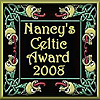
|
|
|
A Talk with Joe O'Connor
Russ Haggerty
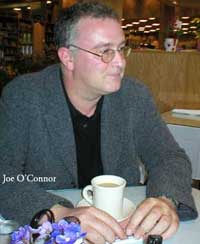 I race to gather the recorder, paper and pens. I yell up the stairs to Bridget, “what are you doing?” She clumps along the landing to come down. The sky looks about to thunderstorm and we snatch our Gortex jackets from the hook as we clatter out the door. We’re in danger of being late to the interview; which starts just after rush-hour on the other side of the city. I race to gather the recorder, paper and pens. I yell up the stairs to Bridget, “what are you doing?” She clumps along the landing to come down. The sky looks about to thunderstorm and we snatch our Gortex jackets from the hook as we clatter out the door. We’re in danger of being late to the interview; which starts just after rush-hour on the other side of the city.
In the car we talk about what we’re going to do. Bridget is prepared: “I have a list of questions written down”. Oh goodie. I wonder if Joe O’Connor smokes. Bridget says no. Why not? He’s Irish, he’s - what - in his early forties? Seems likely to me. Hysteria about health hasn’t ruined Ireland. I find out I’m wrong about that a few months later.
We arrive, park, and as we walk into the book shop it begins to rain.
Talking to the representatives in charge, we’re told he hasn’t arrived yet. We wait in the coffee shop, assured they’ll bring him over when he shows up.
After enough time for me to see the bottom of my cup, Annette Meurer walks in with a pleasant looking man in a tweed jacket. We stand and do the introductions and after ordering coffee for Joe we all sit down. Everyone talks at once and within a few minutes we’re having a very entertaining chat - occasionally we even discuss the book. The carefully prepared questions are largely forgotten and we discover we rather like Joe - very much. Too bad he lives so far away.
So here follows a somewhat organized interview, rather than what actually happened.
Bridget (bless her) is more interested in Joe than she is in his book. She has read part way but not finished. So, she starts off with:
Who’s your favorite character?
“Pius Mulvey. He’s a trickster or a chancer. Someone who isn’t what he seems. You have a lot of fun with a character like that because you know that the reader’s going to enjoy him. And you know they’re waiting for that terrible lie or awful thing that they’re going to do. A villain is just more fun to write about.”
Is it easier?
“It probably is a bit easier - in this case it was easier for me. Pretty much the opening pages of the book just occurred to me, when I started about six years ago, I had this mental image of this guy with one leg walking around the ship and staying up all night.
When did you decide you wanted to be a writer - that it would be your life’s work?
“I can remember wanting to write when I was a young child about 9 or 10. I was one of those children, that you see all the time, that enjoy that kind of imaginary world - that story telling.
At that time - around the 1950s and even into the 70s - there weren’t a lot of fiction writers. in Ireland. People today may find it hard to believe. The great writers - Joyce and Beckett- seemed very distant. It wasn’t like now where you can say ‘there goes Roddy Doyle’, go to readings by well known authors and so on.
In my late teens I decided to try for journalism because I wanted a way of making a living but my heart wasn’t really in it. In those days I would have much preferred to be a writer of fiction. I’m much happier now but I do find it difficult, as time goes on I find it more difficult, but I also find it more enjoyable and when it's going well there’s no feeling like it. Even if I wasn’t doing it as a profession, I’d be doing it in my spare time. Most writers of any kind whether they’re mass market or literary or journalists or playwrights - whatever they are - have that in common. It all starts with a love of it. Writers who are very good at what they do all believe in the craft of storytelling. They feel that stories are important. That they touch some part of us that other art forms cannot. Even in this age of the internet and movies and TV, there’s still that great love of these little black marks on the page that we call words.”
So you’d be doing this even if you didn’t get paid for it.
“I would be, yeah.”
One reviewer quoted you as saying that you moved to London because Dublin was too friendly and not good for the writing craft and yet this book is considered your best and you did it in Ireland.
“Yeah, but I did it not at home in Ireland - I worked in a sort of office. I don’t know what the American phrase would be but some homes in Ireland have a place in the backgarden called a grannyflat. A neighbor had one that they wanted to let; so I wrote this whole book in my neighbor’s grannyflat.”
Sequestered away.
“Pretty much.
All these books along with marriage and one child now, right? How is that effecting things?
It does change your life when you have a child. He’s three now and wonderful but he’s at an age when he wants attention and he’s entitled to the attention. In the old days before I was married and we had James - that's his name - I would think nothing of starting work at 10 o’clock at night and working til 6 o’clock in the morning. I regularly did that. Since we had him, I had to stop all that. I’ll probably live ten years longer and be much healthier since we had him and I’ve had to impose a bit of the self-discipline.”
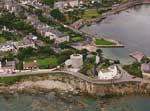 One of the reviews said that you get up on a Monday morning and throw open the curtains and there you are looking at Joyces’ tower.
One of the reviews said that you get up on a Monday morning and throw open the curtains and there you are looking at Joyces’ tower.
“Right, the tower and you have to sit down and write your novel. It can be quite a bit of intimidation but it can also be inspiring. The fantastic thing about Joyce and Beckett, if you read their collected letters, was their dedication to what they were doing. It was a very different age. Irish authors didn’t get advances and all the support and often acclaim that they get now. They lived in great poverty. Most were forced to live in exile. They had a rather tough time. In spite of it all, the letters absolutely resound with confidence. The conviction that they have to keep going. It might be worth nothing but the feeling is that it’ll all be OK.
To me they’re really exemplary figures - heros. When I was a teenager I felt about Joyce, Beckett and Oscar Wilde the way people felt about football players, I genuinely did. It was almost love, actually, that I still feel for them. I sometimes consider going back to the church - in a big way - in the hopes that there will be a heaven and these guys will all be there. That would be, probably, the only reason that I would do it.”
We have a program that we watch over here “inside the actor’s studio” and they ask questions that have nothing to do with their careers - they’re all actors and movie stars. We want to try it on you. So, what is your favorite word?
 “My favorite word? I don’t have just one but in in my last novel Inishowen when people ask me why I wrote that particular novel, I often say and think it's because I like the word Inishowen - it actually sounds like the place. There’s bit of the water breaking on the rocks, a sort of peaty smell of rural Ireland.”
“My favorite word? I don’t have just one but in in my last novel Inishowen when people ask me why I wrote that particular novel, I often say and think it's because I like the word Inishowen - it actually sounds like the place. There’s bit of the water breaking on the rocks, a sort of peaty smell of rural Ireland.”
Your least favorite word?
“Oh God, they’re terrible questions.”
Yes they are.
“Basically, is probably my least favorite word - its kind of mental punctuation - for filling in the time. A lot of polite Irish people use basically while the less polite people would just swear.”
If there is a heaven, as you arrive at the pearly gates, what are the first words you want to hear?
“Come in.”
Well enough of that, sorry.
If you're not writing, what or perhaps, who, are you reading?
“Well my favorite Irish author at the moment is a contemporary, Hugo Hamilton, not well known here and he’s not that well known in Ireland and Britain; he’s written three or four very literary novels that haven’t sold that well though they’ve been warmly reviewed. He’s just written a book that was released at Christmas called the Speckled People. Its been published here, I’ve seen it in stores and I know he’s coming here soon.”
We do get some very good authors in here. But we didn’t expect you.Oh, and Roddy Doyle hasn’t come here (to Cincinnati).
“Roddy Doyle doesn’t go anywhere - he doesn’t leave the house - he doesn’t have to.”
Perhaps your time is not far away.
“Well I hope so.”
Are you planning to bring the family to the United States?
“Yes, I hope to, some time in the next year or two before James gets too big. My wife’s a screenwriter so the beauty of what we do is we can do it anywhere. We’d like to come here for a year.”
And while you over here, what about making a movie out of your book?
“A number of people are reading it with that in mind but I wouldn’t be involved; it would be exhausting. I think it would be quite difficult.”
Well, you’d have to be there and be sure it was alright.
“Yeah, it’s referred to as a consultation , which means 'here it is, we hope you like it and if you don’t - tough'. I’ve had a few novels optioned for film and I like writing for film. I’ve written a few scripts for low budget pictures - but I wouldn’t tackle this one myself, I think it needs someone who is very experienced. It wouldn’t be easy because so much of it is in the past. Yes, there’s the story that takes place on the ship but there’s a huge span of time in the book. Mulvey’s time alone covers thirty or forty years. That kind of book needs very careful handling.”
So what are you working on now?
“I’m working on nothing now.The Star of the Sea is being sold in a number of European countries in translation, so between this trip here and the various trips to Europe, I’ll be occupied until the end of the summer. It’s the number one in ireland. I’m fairly surprised that it’s done that well
We read that it was at the top in Ireland.
“I can only say that it hasn’t had a bad review in Ireland and as you know the famine is a subject that the people there are very interested in and it's a subject that people have strong feelings about. The response cuts across the political spectrum, from reviewers that are very nationalistic to those with more revisionist views. Everybody has had something good to say about the book. Still it wouldn’t bother me if they didn’t; it's the book I wanted to write.”
Have you had a response from some of the Irish that you’re too soft on the British?
“I expected that would happen and conversely I expected from the more revisionist people that -they would say, ‘oh, here we go again - come on we have to move on from all this’ -but no- it seems to have appealed to people from across a range of ideologies.
My view is that if the famine was a war of anybody on anyone else, it was a war of the wealthy on the poor. The Irish did not do much to distinguish themselves. There were a few exceptions but the general consensus now among historians is the people that benefitted most from the famine were the Irish middle class; they added greatly to their landholdings.
There are a few wonderful stories. I have one story about an English Quaker couple from Bristol in the North of England. These people had never been to Ireland, had no connection to the place and barely knew where Ireland was on a map. They had money and when the famine began they moved there simply because they felt they should. The village of Letterfrack in Connemara was the place where they lived, you could say they founded that village. They employed people, paid them above the going rate and probably saved thousands from death. There’s no memorial to them, no statues of them; I suppose, because they wouldn’t fit the mold of an Englishman. I’m married to an English girl , so I’m sleeping with the enemy but I just think that the division of people into the English and the Irish isn’t a particularly useful one.
We know from our own time that when there’s a tragedy, some people behave with heroism and some people don’t. It was no different then.”
In one of your previous interviews you said that you wrote the last chapter first. Have you done that with everything else?
“Yes, generally.”
Did the last chapter change at all?
“Yes it did, of course. It's just a little technique I have. I find it applies with anything I do whether it's an article or a book review or something much larger like a novel. I think it's good to do all of the thinking first and then you know where you’re going.”
And you can’t wander off too far.
“No you can’t and if you do, there’s always something to bring you back. I mean if we were all to leave here now to go to New York, there are fifty ways to go to New York. You can go the direct way or you can go via California - the thing is to know you're going to New York.in the end. I think that helps -it helps me anyway - to think my way through to the end before I start.”
Did you outline the rest of it?
“Yes, in this case I did, because the structure of the book is quite complicated.
Indeed!
“Well, as you know it’s told by a number of different people with a number of different voices. Sometimes it's first person and occasionally third person, there are letters, there are ballads, I wanted that kind of range of tone. But if you do want that, I think its really important to plan it.”
So you laid the whole thing out in advance?
“Yeah, I sort of did it as though I was going on a journey. You wouldn’t want to set out in the ship without your maps and charts. So I had a very clear idea of the architecture of the book before I ever wrote a word. As a result, I did the writing of the book quite quickly. I wrote it in one burst in about nine months from start to finish. Just filling in the structure that I already had.”
One reviewer said you took 10 years and another said you took seven years.
“It depends on how you count it. It was about 10 years ago that I started reading about it and thinking about it. My puzzle was ‘how am I going to get the structure to do this’. What’s more, the challenge was to make it readable. Because in this day and age, it's a terrible truth that we’re all very inured to tragedy. I mean I turn on the TV and I see people dying and, well, we just switch off. I had to be sure my readers wouldn't ‘switch off’.
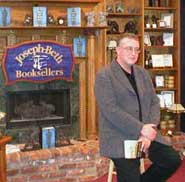 Here, sadly, we were interrupted by Annette Meurer; telling us it was time for Joe to go.
Here, sadly, we were interrupted by Annette Meurer; telling us it was time for Joe to go.
Bridget went to pay the coffee bill and as we all stood up, Joe said he wanted a few minutes to have a cigarette. He and I went outside, to stand under the awning out of the rain and chat a bit more over a smoke. I asked him what he thought of the law banning smoking in the Irish pubs.
“There’ll be bloodshed”, he said.
We learned later that the group gathered to meet Joe were laughing at the crazy Irishmen outside smoking in the rain.
Bridget and I couldn’t stay for the reading but we went over to sit briefly until Joe got well started. We left and we left with regret. In that short time, Joe had become more than a writer we’d come to interview. He had insinuated himself into our affections.
Joe has a quiet manner, a soft conversational voice and a way of begining his answers more than once. During our talk he chose his words so carefully I half expected him to stutter. He doesn’t, he’s just sure of his thoughts and self-effacing enough to care how they are heard.
I only noticed one affectation (and I wonder if it was that) - his glasses are much like the glasses Joyce wore; and Yeat’s as well. I think they’re an appropriate choice.
Click here to read our review of Star of the Sea.
|
|
Fri, Sep 27, 2024
 The Galway Hooker The Galway Hooker
This unique vessel, with its distinctive curved lines and bright red sails, originated in the village of Claddagh. During the 19th century, hookers supported a significant fishing industry and also carried goods, livestock and fuel. Seán Rainey is remembered for building the last of the original boats, the Truelight, for Martin Oliver who was to become the last king of the Claddagh; as king, he was entitled to white sails on his boat. Since the mid seventies, many of the old sailing craft which were on the verge of extinction have been lovingly restored and new ones have been built. During the summer months they can be seen at festivals such a Cruinniú na mBád - the Gathering of the Boats - in Kinvara.
Click for More Culture Corner.
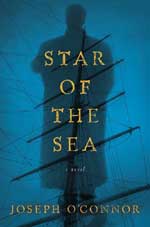
Star of the Sea
by Joseph O'Connor
The epic journey of a famine ship and the lives of its passengers, which Roddy Doyle says is his best yet.
Click here to buy Star of the Sea.
|
|
|
|
|




 The Galway Hooker
The Galway Hooker